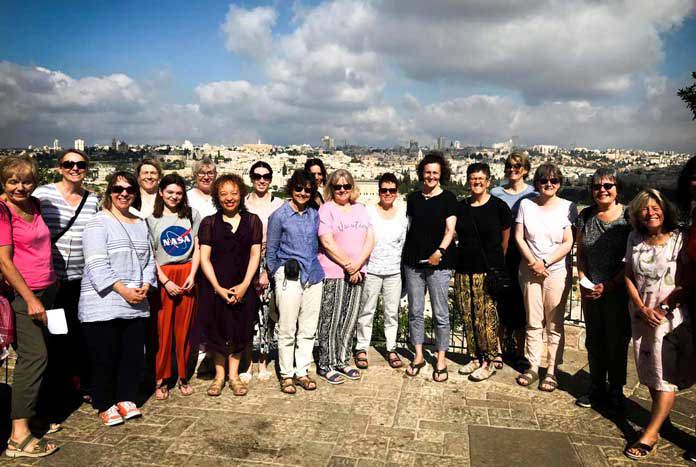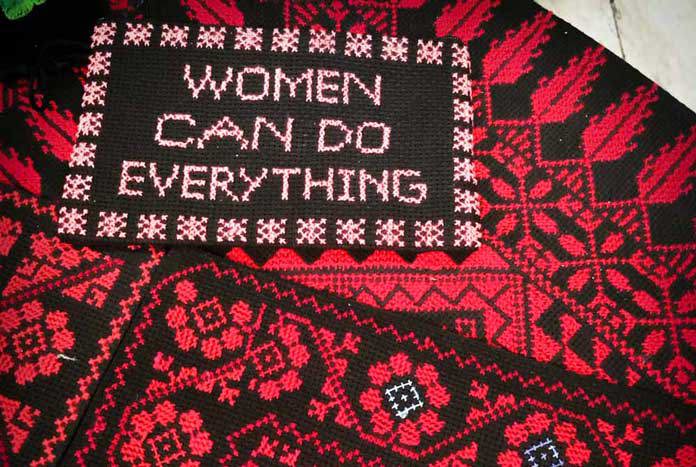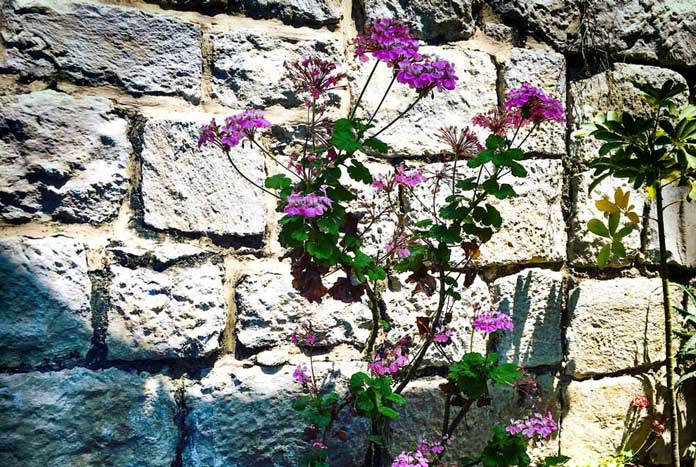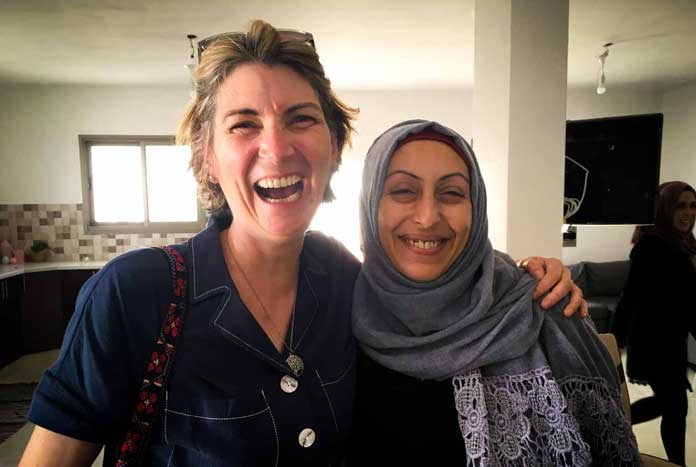‟As Westerners we travel with huge privilege, relative wealth, social and religious freedom and we carry the baggage of empire, colonialism and militaristic imperialism.” Read about Amos trustee Jess Foster’s recent women-only trip to Palestine.
Amos trustee Jess Foster visiting the house and family of our recent home rebuild in the occupied West Bank.
The violence of the weak grabs attention while the powerful structures of violence remain invisible.
Jean Zaru — Ramallah, June 2019.
Travelling with Amos to Palestine, particularly as a group of women, it is easy to think that we are more connected with the ‘weak’ in this land; we support Palestinians without many basic rights, or the freedom to travel; we too are women and we identify with the women who suffer the double burden of the occupation and a patriarchal culture and many of us are also Christian and we share the faith of Christians in the Holy Land who can trace their families back hundreds of years and were the first to follow Jesus but are now leaving to find dignity and freedom in other corners of the globe.
But the reality is that we have more in common with those perpetuating structures of violence. As Westerners we travel with huge privilege, relative wealth, social and religious freedom and we carry the baggage of empire, colonialism and militaristic imperialism. Simply visiting does not give us the right to assume an air of victimhood, to feel we are free from collusion with power because we spent a week hearing stories or to point angry fingers at oppressors while we benefit from unjust systems and structures.

The Old City: The women-only group from Amos Trust standing at the top of the Mount of Olives over-looking the Old City of Jerusalem.
So, should we come at all? Why do we visit and who benefits from our presence? Firstly, I think if we cannot come in humility and self-awareness, we should not come at all. If we feel better than any of the people struggling to live in these lands we should stay at home.
As Westerners we travel with huge privilege, relative wealth, social and religious freedom and we carry the baggage of empire, colonialism and militaristic imperialism.”
Whenever I visit this place, I learn something so profound that it changes me on a deep level. It might be something someone said, it might be something I saw or experienced, but I have never gone home unchanged, I have never simply had my prejudices confirmed or my preconceptions strengthened. I come back here because I need to learn and when I think I have answers I think I need to stop coming.
Secondly, we must come with generosity. Sometimes talks are longer than we wanted, people are delayed, gift shops don’t have precisely what we want, the hotel bathroom is not exactly what we expected. If we come without open hands, if the schedule is too busy for encounters that will surprise us, if we are unwilling to support a struggling economy then we should stay at home. If we are obsessed with efficiency, value-for-money and strict timetabling we will remain simply tourists and miss the opportunity to be honoured guests.

Handy-craft in Hebron: Produced by a women’s collective, this purse was bought by one of the youngest members of the Amos group and was a great reminder of the potential women have for the rest the trip.
Thirdly, we must come willing to act. As our group visited Tent of Nations, our host, Jihan Nasser urged us to “Come and see, then go and tell.” We were welcomed everywhere we went with fantastic hospitality, raw honesty, gracious humour and with hope. Hope that was generated by being seen and heard. Hope that the narratives of Palestinian women might be retold and heard by people with the power to change something.
I think if we cannot come in humility and self-awareness, we should not come at all. If we feel better than any of the people struggling to live in these lands we should stay at home.”
Time and again, we heard that people felt no-one cared, that the injustice and oppression experienced on a daily basis counts for nothing on the global scene and as things grow harder politically the silence rings louder and louder. I am so grateful I had the chance to join this group.
I am grateful for the opportunity to see and hear women who make an incredible difference at every level. I am grateful for a new layer of understanding in a complex and complicated context. I am grateful that I could be there and in a tiny way, a tiny drop in the ocean-way, our being there made a difference. But I go home determined to bear witness where I can, to speak the truth that we have seen and heard and to work with every group and individual who seeks equal rights for every person who lives in this holy land.

How does your garden grow? Flowers growing in the Women’s Studies Centre in Nablus. “Teach a girl — build a family as if you are planting flowers in your free home land.”
I go home changed again, challenged to make visible the structures that are violent and oppress with power — in the Holy Land but also at home in the UK. I cannot go home and point the finger unless I am committed to try to see those structures that are invisible to me and to count the cost of disengaging from those same unjust structures which bring me great benefit.
Jessica Foster is a tutor in Interfaith Engagement at the Queens Foundation, a theological college in Birmingham. She has visited Palestine several times in the last few years, exploring the conflict from many different perspectives and is an Amos trustee.
Find out more about Amos’ work in Palestine.
— — — — — — —
Please sign up to receive Amos Trust’s E-news which will keep you updated about our work in Palestine, our On Her Terms campaign for girls and young women on the streets and our Climate Justice work in Nicaragua.



















